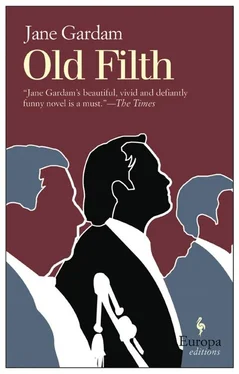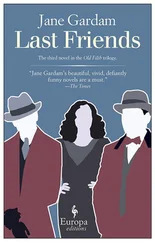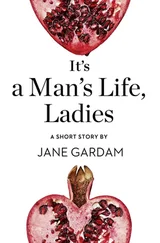“She talks of Spain. She has an urge to help the rebels. I thought I might telegraph her parents.”
“Let her be,” said Pat. “She’ll be in for dinner.”
“But did she have breakfast ?”
“Well, it was all laid up for her on the sideboard.”
“I wouldn’t want her going home and saying we’d given her nothing to eat. And oh dear, look! Maybe she didn’t have breakfast.”
Isobel could be seen writhing about in her haversack and then disembowelling it on the grass. She took from it a hunk of bread, stood up, tilted back her head and began to devour it. Her eyes seemed closed. Praying perhaps.
“I think she may be a little peculiar,” said Colonel Ingoldby. “There is some of that in the Ingoldbys. Not Pat, of course, dear, and certainly not Jack.”
Elder brother Jack, the beloved, now passed through High House only very occasionally. Sir and the family’s traditional public school had seen him to Cambridge and he was there or abroad most of the time, swooping through his old home, once or twice a summer, bringing rare and various companions, playing wonderful tennis, clean and groomed, at one with his parents’ world. Mrs. Ingoldby, like a dog which awaits its master, seemed to know by instinct when he was on the way. “Just a mo. Isn’t that Jack?” They would listen, then continue life, and a few minutes later would come the splutter and roar of Jack’s car, its silver body tied up with a classy leather strap.
Eddie had an instinct about Jack, too; that Isobel was being kept away from him and that was why she and Mrs. Ingoldby were off to the Lake District. That was why Isobel was peculiar. Seeing Isobel in the garden he could tell that the Lake District and her godmother would not be sufficient for her.
“Oh, do bring her in,” said Mrs. Ingoldby, “or at any rate someone go and talk to her. . You, Eddie. Would you go? You’ll be new to her — she finds us boring. You could talk to her about the Spanish Civil War. I don’t want any stories about our neglecting her going back to Gerard’s Cross.”
So Eddie had walked rather awkwardly across the lawn and into the trees, on his fourteen-year-old lengthening legs and oval knees. His curly hair; his hands in his pockets like some of the more blasé of the Mr. Smiths’ had been. His feet in scruffy sand-shoes very huge; his height endearing. His voice, breaking, was surprising him all the time by sudden booms and squeaks. Yet there was grace about him. He hadn’t taken in a thing about the Spanish Civil War.
The girl was standing with her back to him. The rain had stopped and it was becoming a warm and honeyed July morning and in the hills below stood the factory chimneys rising brown and mighty like Hindu temples.
“Oh, hullo,” he said.
The girl stopped munching and turned. She stared.
“I’m Edward Feathers. Pat’s friend. I’ve been told to ask if you — well, if you might be coming in for lunch?”
The girl was gigantic; bony, golden and vast; as tall as Eddie and certainly pretty old. She could be twenty. Her face was like a lioness’s — flat nose, narrow brow, wide cheekbones, long green eyes. Supreme self-command. Wow!
Her legs were bare and very long, like his own, and her sandals had little leather thongs separating the toes.
Eddie felt something happening to his anatomy and though he had no idea what it was he began to blush.
She looked him up and down and began to laugh.
“I don’t go in for eating round a polished table,” she said. “I need to be out of doors. They know that.”
“They didn’t seem to. Oh, well, OK, then. I’ll tell them.” And he fled.
“She says she doesn’t like eating round a polished table.”
“Oh, God,” said Pat.
“That’s her mother,” said the Colonel.
“I’m afraid I’m going to have a difficult time with her in the Wastwater Hotel,” said Mrs. Ingoldby.
“Maybe the table won’t be polished,” said Pat. “Anyway, why take her? Jack’s abroad.”
His mother gave him what in any other woman would have been a searching look. “I am her godmother,” she said, “and her mother has gone off with a Moroccan drummer.”
“I don’t blame her,” said Pat. “Fevvers’ mother went off, and he doesn’t go eating in the trees.”
“Oh, Teddy! I didn’t know! I thought your mother only died .”
“She did only die,” said Eddie. “She died when I was two days old.”
“She must have caught sight of you,” said Pat.
“That will do,” said his mother, and “Damn bad luck,” said his father, “don’t suppose there were many Moroccans in Malaya.”
“There were a lot of drummers,” said Eddie and began to squeal and cackle. The Colonel and his wife looked baffled and embarrassed.
Pat had given Eddie some sort of sudden freedom. Eddie’s ideal mother, whom he had always thought of as an Auntie May sort of person, became a houri, off to bed and that with a Moroccan drummer! Pat had given him confidence. Right from the very start. And crikey, he needed it, now, after that thing that had happened to him in the trees. He wondered whether to mention it to Pat; then knew that it was the first thing ever that he couldn’t discuss with him.
Pat was watching him.
“Shall we go out on bikes?”
“Yes, great. Yes, please.”
“OK, Ma?”
“Yes. But what are we to do about Isobel?”
“It’s out of our hands to do anything about Isobel.”
And the leopardish girl went prowling past the windows, haversack in place and reading a map.
“She’s a fine looker, I’ll say that,” said the Colonel.
“Jack thinks so, too,” said Pat.
The two of them trudged up a hill, pushing their bikes, wishing for modern three-speeds and not these childhood toys with baskets. “And you — hein?”
Eddie said nothing.
At supper Isobel appeared and sat down at the Colonel’s right hand. She leaned back in her chair and glittered her eyes. “What a pretty dress,” said her godmother. “Were you thinking of taking it to Spain? I’m sure it has to be dry-cleaned. It will be difficult at the frontier.”
Isobel messed with her food.
“Oh, dear. I’m afraid you’ve stopped liking fish-pie. You used to love. .”
“It’s fine,” said Isobel, scraping it about with the tips of the prongs of her fork. She had picked out all the prawns and now leaned her sun-burnt shoulders towards Eddie and began to pick prawns off his plate.
“Yummie,” she said, and Eddie found himself in trouble again beneath the tablecloth. He blushed purple and Pat exploded in his glass of water.
“I think she’s after you,” Pat said after dinner, playing tennis with Eddie in the dark. “Go easy. She’s a cannibal. It’s going to rain. We’ll have to go in. Get the net down. She’ll be out there somewhere, gleaming in the bushes. Aren’t you going to laugh?”
But Eddie, busy catching up tennis balls, winding up the net, said nothing. On the way back to the house he slashed at vegetation for all he was worth.
“Sorry I spoke,” said Pat. “Only joking.”
“Oh, shut up,” said Eddie. “I can’t stand your cousin. OK? Sorry.”
But they stopped at the bench for the view from the hill. “Can’t see much, but we could maybe hear the nightingale. Then we could send a card to Sir,” said Pat.
“It’s too late for the nightingale. And too far north.”
“D’you want a weed?” Pat lit up a cigarette.
“No fear.”
“It turns on the girls. Not that you seem to feel the need.”
“It’s disgusting. It’s all disgusting,” Eddie yelled out and pushed Pat off the seat and sat on him. Pat flailed about and then began to sing:
Читать дальше












